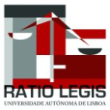Livro “The Relevance of Migration for the 2030 Agenda for Sustainable Development”
 No dia 1 de outubro de 2018, a Universidade Autónoma de Lisboa e os seus centros de investigação, Ratio Legis e OBSERVARE coorganizaram, com o apoio do Instituto Camões e da FCT, uma conferência internacional sobre o contributo das migrações para os objetivos do desenvolvimento sustentável da Agenda 2030, à luz do Pacto Global para as Migrações e da política europeia de imigração. O evento reuniu académicos e políticos para discutir a relevância das migrações para o desenvolvimento de países de origem e de destino, o impacto da política europeia de imigração e asilo na gestão da migração legal e o contributo do Pacto Global para enfrentar os desafios atuais das migrações internacionais. Esta conferência foi a base desta obra coletiva, que pretende contribuir para uma perspetiva mais esclarecida e esclarecedora das migrações internacionais. O livro está dividido em três Partes. Cada uma é dedicada às principais questões abordadas na conferência mencionada. A Parte I é dedicada à relação entre migrações e desenvolvimento e ao contributo positivo das migrações internacionais para os países de origem e de destino. A avaliação da política de imigração da EU e o seu contributo para uma imigração regular e segura são os temas abordados na II Parte. A Parte III é dedicada ao Pacto Global. O livro foi enriquecido com um prefácio de António Vitorino, Diretor-Geral da OIM, um artigo introdutório de Augusto Santos Silva, Ministro dos Negócios Estrangeiros e a intervenção de S. Exa. o Presidente da República, Marcelo Rebelo de Sousa, proferida na sessão de encerramento da conferência.
No dia 1 de outubro de 2018, a Universidade Autónoma de Lisboa e os seus centros de investigação, Ratio Legis e OBSERVARE coorganizaram, com o apoio do Instituto Camões e da FCT, uma conferência internacional sobre o contributo das migrações para os objetivos do desenvolvimento sustentável da Agenda 2030, à luz do Pacto Global para as Migrações e da política europeia de imigração. O evento reuniu académicos e políticos para discutir a relevância das migrações para o desenvolvimento de países de origem e de destino, o impacto da política europeia de imigração e asilo na gestão da migração legal e o contributo do Pacto Global para enfrentar os desafios atuais das migrações internacionais. Esta conferência foi a base desta obra coletiva, que pretende contribuir para uma perspetiva mais esclarecida e esclarecedora das migrações internacionais. O livro está dividido em três Partes. Cada uma é dedicada às principais questões abordadas na conferência mencionada. A Parte I é dedicada à relação entre migrações e desenvolvimento e ao contributo positivo das migrações internacionais para os países de origem e de destino. A avaliação da política de imigração da EU e o seu contributo para uma imigração regular e segura são os temas abordados na II Parte. A Parte III é dedicada ao Pacto Global. O livro foi enriquecido com um prefácio de António Vitorino, Diretor-Geral da OIM, um artigo introdutório de Augusto Santos Silva, Ministro dos Negócios Estrangeiros e a intervenção de S. Exa. o Presidente da República, Marcelo Rebelo de Sousa, proferida na sessão de encerramento da conferência.
Link para o download da obra: The Relevance of Migration for the 2030 Agenda for Sustainable Development (.pdf).
On 1 October 2018, Universidade Autónoma de Lisboa and its research centres, Ratio Legis (Law) and OBSERVARE (International Relations) co‐organized, with the financial support of the Camões Institute and the FCT, an international conference on the contribution of migration to the 2030 Agenda development goals, in the light of the Global Compact on Migration and of the European migration policy. The event brought together leading academics and politicians to discuss the relevance of international migration for the development of origin and destination countries, the impact of European migration and asylum policy on the management of legal migration and the input of the Global Compact to tackle the current challenges of international migration, as a tool for the achievement of the Sustainable Development Goals. This conference laid down the foundation of this collective book, which aims to contribute to a more enlightening and enlightened perspective of international migration This book is structured in three main Parts. Each Part takes into consideration the main questions addressed in the above‐mentioned international conference. Part I deals with the link between migration and development and the positive output of international migration to the development of both origin and destination countries. The assessment of the EU immigration policy and its impact on a regular and safe international migration is covered in Part II. The Global Compact on Migration is addressed in Part III. The book is enriched with a Foreword by António Vitorino, Director General of the IOM, an introductory article by Augusto Santos Silva, Minister for Foreign Affairs of Portugal, and with the intervention of His Excellency the President of Portugal, Marcelo Rebelo de Sousa, delivered in the conference closing session.
Download the book: The Relevance of Migration for the 2030 Agenda for Sustainable Development (.pdf).

